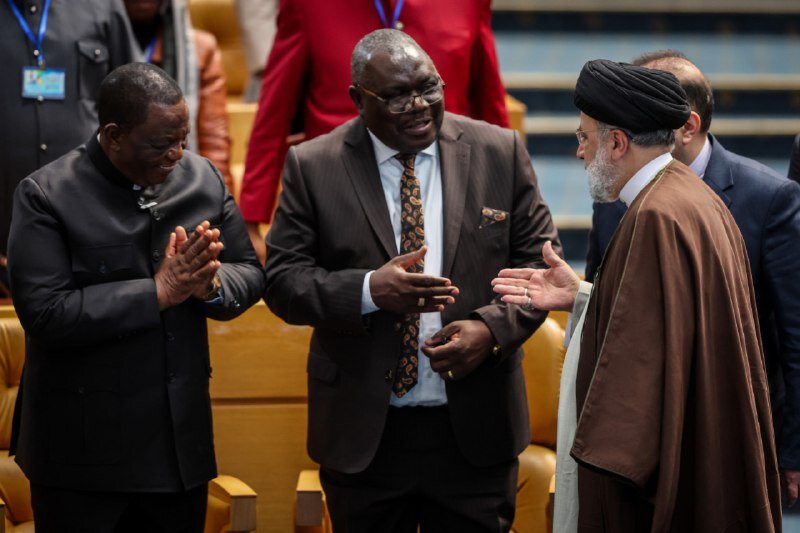Iran, Africa explore a sea of economic opportunities

TEHRAN- In a remarkable gathering of diplomatic and economic significance, Tehran, the bustling capital of Iran, plays host to a congregation of economy ministers representing over 40 African nations at the esteemed second Iran-Africa International Summit, slated from April 26th to 29th.
The inaugural ceremony witnessed the dignified presence of senior Iranian officials, including President Ebrahim Raisi and Minister of Industry, Mining, and Trade Abbas Aliabadi.
In his address at the opening ceremony, President Raisi expressed Iran's unwavering commitment to fortifying economic ties with the African continent.
"This assembly epitomizes the collective determination of African nations and Iran to expand our economic bonds," declared President Raisi, underscoring the symbolic significance of this gathering.
He highlighted the historical resonance of cooperation with Africa, tracing its roots back to the visionary ethos of the Late Founder of the Islamic Revolution, Imam Khomeini, and further reiterated by the Leader of the Islamic Revolution, Ayatollah Seyed Ali Khamenei.
Reflecting on Africa's history, President Raisi articulated Iran's empathetic stance. "The narrative of Africa's past is stained by the exploitation of its resources by Western powers," he lamented, emphasizing the need for mutually beneficial economic collaboration.
President Raisi envisaged a future where the fruits of Iranian productivity in agriculture, industry, medicine, and healthcare could find resonance in African markets. "Our agricultural produce, industrial output, and medical advancements stand poised for export to Africa," he affirmed, echoing Iran's proactive engagement on the global economic stage.
Despite enduring decades of geopolitical tensions, economic sanctions, and external pressures, the Islamic Republic of Iran has steadfastly upheld its principled stance towards Africa, rooted in shared political and cultural affinities. "Even amidst the tempest of Western sanctions and disruptions, Iran has stood in solidarity with the peoples and nations of Africa," President Raisi asserted, highlighting Iran's enduring commitment to fostering constructive partnerships.
Echoing President Raisi's optimism, Mohammad Sadeq Ghanadzadeh, the director general of the Africa Department at the TPO, envisioned a promising trajectory for bilateral trade. While acknowledging the stagnant trade volumes of the past, he expressed confidence in a revitalized economic landscape, buoyed by concerted efforts to streamline trade routes. "The current initiatives to facilitate trade channels with Africa herald a new era of economic collaboration," said Minister Ghanadzadeh, forecasting a tenfold increase in trade figures, soaring from $1.2 billion to a promising $10 billion within the next three years.
As Tehran resonates with the vibrant discourse of economic diplomacy, the second Iran-Africa International Summit emerges as a beacon of hope, charting a course towards a future marked by equitable partnerships and shared prosperity between Iran and the nations of Africa.
Iran-Africa summit: exploring shared history and economic futures
The historical affinities shared between Iran and Africa stand poised to catalyze a new chapter in their economic relationship, a narrative unfolding against the backdrop of the Tehran summit. This summit, a crucible of diplomatic engagement, serves as a platform to explore the vast potential for trade and economic collaboration between the two regions.
At the heart of Iran's approach lies a stark departure from the exploitative tendencies of Western powers in their dealings with Africa.
Tehran's vision transcends mere economic gain; it aspires toward a cooperative framework that mutually enriches both parties. This ethos of mutual benefit distinguishes Iran's stance compared with the West's.
A cursory glance at the annals of history reveals a shared experience of colonial subjugation endured by both African nations and Iran. In the ruthless pursuit of their interests, Western colonizers exploited Africa's abundant natural resources, heedless of the consequences for indigenous populations. Similarly, Iran has grappled with the encroachments of colonial powers, bearing witness to a legacy of exploitation and marginalization.
Yet, amidst the shadows of colonialism, glimmers of solidarity emerge from the shared struggles of Iran and Africa. The Tehran summit symbolizes a convergence of destinies, where the echoes of past injustices resonate with a shared determination to forge a brighter future. Beneath the surface of economic exchange lies a tapestry of cultural and historical threads binding the two regions together.
Beyond the tangible gains in trade and commerce, the Tehran summit heralds the dawn of a multifaceted partnership, underpinned by these deep-rooted commonalities.
As Iran and Africa navigate the complexities of globalization, the summit offers a platform for collaboration across diverse fields.
In embracing their shared heritage, Iran and Africa stand poised to chart a course toward mutual prosperity and progress.
